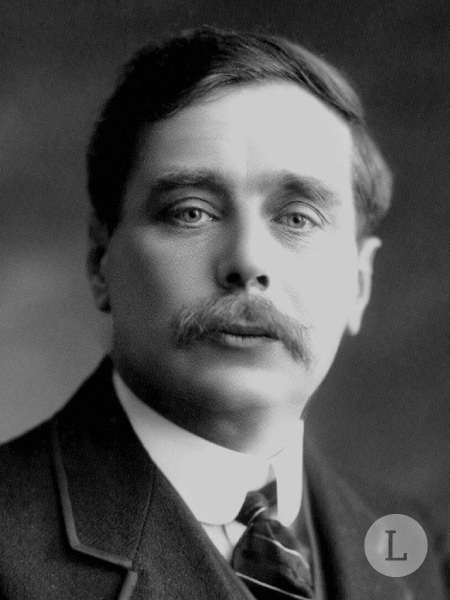
born: SEPTEMBER 21, 1866
died: AUGUST 13, 1946
nationality: BRITISH
genre: SCIENCE FICTION
Herbert George Wells, commonly known as H.G. Wells, was a prolific British author known for his groundbreaking science fiction novels and thought-provoking social commentaries. With works like The Time Machine and The War of the Worlds, Wells captivated readers with his imaginative storytelling and astute observations on society, technology, and the human condition.
EARLY LIFE AND EDUCATION
H.G. Wells was born on September 21, 1866, in Bromley, Kent, England. His parents, Joseph Wells and Sarah Neal, owned a small shop, but the family lived in relative poverty. Wells’ early education was sporadic due to his family’s financial struggles; however, he eventually won a scholarship to the Royal College of Science in South Kensington, London, where he studied biology under the tutelage of renowned scientist T.H. Huxley.
CAREER AND LITERARY SUCCESS
Wells’ writing career began with a series of articles and textbooks on science, but it was his venture into fiction that would bring him lasting fame. His first novel, The Time Machine (1895), was an immediate success and established him as a leading figure in the emerging science fiction genre. Over the course of his career, Wells penned numerous novels, short stories, and essays, often exploring futuristic themes and providing insightful social critiques.
TOP 10 BOOKS BY H. G. WELLS
The Time Machine (1895)
Wells’ groundbreaking debut novel tells the story of a Victorian-era inventor who travels into the distant future, encountering strange civilizations and exploring themes of social inequality and the consequences of unchecked technological advancement.
The Island of Doctor Moreau (1896)
This dark and gripping tale follows a shipwrecked man who discovers an isolated island inhabited by the sinister Dr. Moreau and his grotesque, genetically engineered creations.
The Invisible Man (1897)
A thrilling story about a scientist who discovers the secret of invisibility and grapples with the ethical implications and newfound power that his discovery brings.
The War of the Worlds (1898)
Wells’ iconic alien invasion story has captivated readers for generations, offering a chilling vision of humanity’s struggle against an advanced and ruthless extraterrestrial foe.
The First Men in the Moon (1901)
This imaginative novel follows two men who journey to the moon, encountering an alien civilization with its own unique culture and societal structure.
The Food of the Gods and How It Came to Earth (1904)
A satirical novel that explores the consequences of a scientific discovery that accelerates growth, leading to gigantic animals and plants that threaten humanity’s dominance on Earth.
Kipps: The Story of a Simple Soul (1905)
This social commentary novel follows the life of a young orphan who inherits a fortune, shedding light on the complexities and hypocrisies of Edwardian society.
Tono-Bungay (1909)
A semi-autobiographical novel that critiques the materialism and moral decay of Edwardian England, as seen through the eyes of a young man caught up in the world of advertising and consumerism.
The History of Mr. Polly (1910)
This satirical novel tells the story of Alfred Polly, a dissatisfied man who dreams of escaping his mundane existence and embarks on a series of comic misadventures. Faced with financial struggles and a failing marriage, Mr. Polly ultimately finds an unconventional path to personal happiness and self-discovery.
The Shape of Things to Come (1933)
A speculative work that envisions a future world devastated by war and struggling to rebuild, ultimately leading to the creation of a utopian society through scientific and social advancements.
INTERESTING FACTS
- Wells was a lifelong advocate for social reform, and his political views often found their way into his novels and essays.
- He was nominated for the Nobel Prize in Literature four times but never won the award.
- In addition to his writing, Wells was a prolific artist, and many of his drawings and sketches can be found in the H.G. Wells Society’s archives.
- Wells’ works have been adapted into numerous films, radio plays, and television shows, most notably the 1938 radio broadcast of The War of the Worlds by Orson Welles, which caused widespread panic due to its realistic portrayal of an alien invasion.
- Wells’ 1920 book, The Outline of History, was one of the best-selling nonfiction books of its time and remains a landmark in the popularization of world history.
AWARDS AND HONORS
Although Wells never won the Nobel Prize in Literature, his contributions to the literary world have been recognized with several posthumous awards and honors. In 2000, the Science Fiction and Fantasy Hall of Fame inducted Wells as one of its inaugural members, and in 2005, the H.G. Wells Society established the H.G. Wells Award to recognize outstanding contributions to the study and appreciation of his life and works.
DEATH AND LEGACY
H.G. Wells passed away on August 13, 1946, at the age of 79. His innovative storytelling and imaginative exploration of futuristic themes left an indelible mark on the science fiction genre. Wells’ work continues to influence writers and filmmakers, and his thought-provoking social commentaries remain relevant even in the 21st century.
